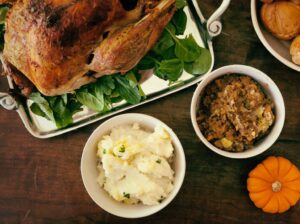By: Callie Dyer, Resident in Counseling

The holidays are a time for connection and celebration, but if you struggle with an eating disorder, they are also a time of anxiety. Many hurdles can arise throughout the holiday season – such as comments from others on eating and appearance, inconsistent timing of meals, unfamiliar food choices, and stress around loss of routine. If you are feeling a sense of overwhelm and dread over the upcoming holiday, you are not alone. This is a stressful time in so many ways and you deserve to prioritize your own needs. Here are 5 tips for making Thanksgiving as tolerable as possible:
Build in accountability around meals
Some of your family members may forgo earlier meals throughout the day, but that doesn’t mean you have to! Make intentional plans to ensure you maintain your regular eating schedule. For example, you could schedule a Zoom brunch date with friends or offer to make Thanksgiving Day breakfast for your family at a specified time. Set a plan ahead of time and tell someone about it, so that you do not spend Thanksgiving morning trying to decide when to eat.
Shift your focus toward gratitude
If Thanksgiving dinner is the primary thing on your mind, try shifting your thoughts to the reason behind the holiday – gratitude. Write down a list of enjoyable, uplifting, and positive things in your life. Reflect on how it feels to have the day off of work or school. Thanksgiving dinner may get the most attention, but it is only one part of the day. Do not let yourself forget about the other parts of the day that you appreciate. In fact, it might be helpful to establish non-food traditions, such as an afternoon football game with the family or an annual holiday movie marathon. This creates a positive distraction from the meal and something to look forward to every year.
Remember that it is just another meal
Remind yourself that, at the end of the day, Thanksgiving dinner is just another meal. It is no more significant than any another Thursday night meal. You can and will eat breakfast, lunch, and dinner on Thanksgiving like any other day! This is just another opportunity to increase your flexibility around food. It is another opportunity to honor your body’s needs and wants. Are you currently working on noticing your body’s hunger cues? Eating more mindfully? Challenging yourself to try fear foods? All of your goals will be the same on Thanksgiving Day. You’ve gotten through so many other challenging meals and you will certainly get through this one.
Set boundaries, and then more boundaries
Let your family members know that you will be eating regularly throughout the day and ask them to avoid commenting on your eating in any way. Take a few moments to step away from the table if the conversation is triggering – offer to help with something in the kitchen, step outside for some fresh air, or find a quiet space to do some deep breathing. Say, “I don’t feel comfortable with this conversation right now.” Shut things down, take a step away, and protect your recovery.
Remind yourself of your why
One day, you will be able to enjoy holiday meals stress-free. Until then, find ways to surround yourself with reminders of why you want to recover, such as:
- Following those who are recovered on Instagram
- Listening to a recovery-focused podcast
- Turning on some music that boosts your confidence
- Creating a photo album on your phone that lifts your mood
- Carrying a notecard with a handwritten list of your motivations for recovery
- Texting others who are also in recovery
- Logging your thoughts into a recovery app for your dietitian or therapist
You cannot necessarily prevent family members from making unhelpful comments, but you can turn down the volume on them by listening more closely to those who share your recovery mindset. This is the perfect time to rely on your support systems – near and far.
